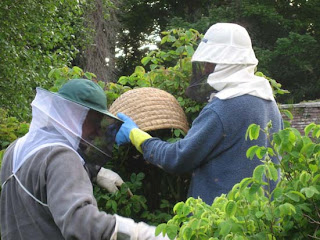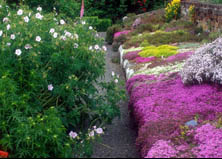"A swarm of bees in June ...."

I've just got back from the garden in late evening where we have been collecting a bee swarm that arrived in a rose bush this afternoon. Of course it just happened to be one of my favourite roses, rich, darkly scented, purple red, and to collect the bees some of the top growth would have to be cut off ... My son, Tom, who is a beekeeper (and has his own website of photographs at www.tomwhitephoto.co.uk) put our old straw skep on top of the rose branches where the swarm was clustering so that the bees would go up into it - they climb upwards naturally and into the dark skep balanced on the branch where the queen was. Left like that til dusk, the bees should all end up in the skep ready to be scooped up - a free prize to a beekeeper.
Using a smoker to encourage the bees to move up the branches, they carefully snipped bits off the rose until the ball of bees was hopefully mostly in the skep and then - this is the difficult bit - tipped the skep into a hessian sack. It's a dramatic moment when the combined buzzing of thousands of bees is heard! You always hope that somewhere in the mass, the queen is there. With the sack tied up (it has to be breathable so hessian is good) the bees were put in the landrover and taken off to a hive that Tom had prepared ready to take them. The old saying of 'a swarm of bees in May is worth a load of hay, a swarm of bees in June is worth a silver spoon, a swarm of bees in July is not worth a fly' means that the earlier a swarm is collected the more valuable it is - well, to get one on May 31st is pretty good!
The other thing that has happened this week has been that is was week 4 of the Poetry Workshop run by poet Linda France. It has been wonderful to see the people on the course quietly taking in the garden in a very deep way - really looking and having the time to reflect (which I envy them as I am always looking for the next job to do!) This is a photograph of the group meeting up at the beginning of the morning.
The workshops are leading up to the event on Midsummer's Day, June 21st, when there will be the world premier of the collaboration between Linda France and world renowned sound recordist, Chris Watson (recently seen on Springwatch). Throughout the day there will be timed presentations of this extraordinary work with live presentations of Linda's beautiful cycle of poems that she wrote from visiting Chesters Walled Garden once a month on the day of the full moon for a calendar year. Chris recorded the sounds of the garden as the birds went to bed and work in the morning (4 am I think it was!). There will also be elderflower champagne, strawberries and music from Northumbrian piper, Sue Dunne. Look out for details on www.queenshall.co.uk.





